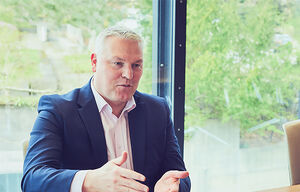Credit Suisse's Bulwark
Finance boss David Mathers is the only Credit Suisse top executive to survive years of restructuring. He knows every inch of the bank – which makes him virtually irreplaceable.
Approximately is never exact enough for David Mathers: the Credit Suisse finance boss is known to punch the buttons of his calculator long enough to give a very precise answer – even when roughly would be good enough.
The 53-year-old Briton's obsession with detail is a huge part of what endeared him to former CEO Brady Dougan, who in 2010 tipped him for the finance job. Nine years later, Mathers proved his versatility by smoothly handling the dicey wind-down of Credit Suisse's bad bank.
Burying Bodies
That was one reason Mathers held onto his job in a management purge when current CEO Tidjane Thiam took over in 2015: He «knows where all the bodies are buried at Credit Suisse (mainly because he buried most of them)», analyst Dan Davies remarked acerbically after Mathers survived as one of the only Dougan-era allies in top management.
Mathers was left unscathed by last month's shuffle of top management, illustrating his indispensability to Thiam. He is now one of European banking's longest-serving finance chiefs – and one of the few holdovers from the financial crisis of 2008-09.
Crisis Response Architect
The Cambridge-educated banker's extensive knowledge of Credit Suisse goes further back than when he was lifted into top management in 2010: Mathers spent the three years prior to this as finance and operating chief at Credit Suisse's investment bank, then an influential credit player on Wall Street.
Dougan is widely credited for navigating Credit Suisse through 2008 without government help – but Mathers also had a key role in keeping the investment bank from avoiding a UBS-sized wipeout on subprime mortgage securities. The banker, who rose in Dougan's wake, was also the architect of a restructuring of Credit Suisse's investment bank in autumn of 2008.
Mathers internally referred to the 2008 reorganization that shored up the securities unit's profits in the following years as «Plan E»: he had apparently already shredded Plans A, B, C, and D in his fevered efforts to stave off the crisis.
Excelling in Crisis
Mathers' value to the bank is that he has gone the extra mile for Credit Suisse when the bank needed it most. Unflappable and dazzlingly smart, Mathers seemed to excel in stressful situations like 2008, when the Swiss bank – like most of its European rivals – went hunting for money.
Mathers, who was plucked out of equity research by the late Paul Calello in 2007 and subsequently drew the attention of then-CEO Dougan, also fulfills another key function for Thiam that no one else can. The CFO is one of the few direct links back to the investment bank for Thiam, whose ties to Credit Suisse's Wall Street faction remain somewhat tenuous after a rocky start.
Shuns Limelight
His other key merit to management is that while he is keenly aware of his powers, he doesn't like the limelight. Most recently, Mathers successfully wound down Credit Suisse's bad bank in three years after Thiam ordered their disposal in 2015, to little fanfare.
He also claimed little credit for a 2012 cash call effectively prescribed by the Swiss National Bank (Mathers also took little of the heat when the central bank publicly singled out Credit Suisse for its thin capital cushion).
Close Ties to Olayan and Norges
The dismantling of Credit Suisse's so-called strategic resolution unit was leisurely three-year project, but others were down to the wire. In 2012, it took Mathers one month to collect enough cash including from Norway's sovereign wealth fund Norges to satisfy the SNB (the bank had originally fended off the SNB's highly unconventional order).
- Page 1 of 2
- Next >>





















